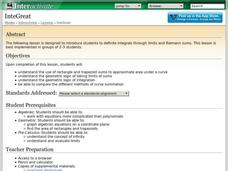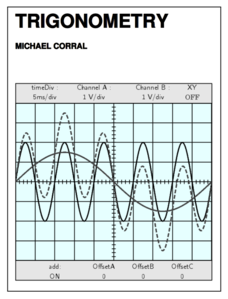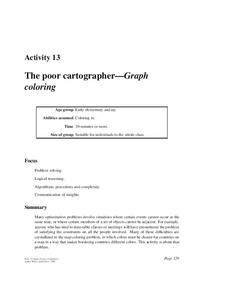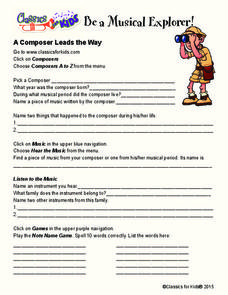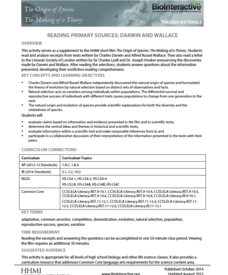Curated OER
Plate Tectonics
Help young scientists piece together the theory of plate tectonics with this comprehensive collection of materials. Whether your are looking for worksheets, hands-on activities, or assessments, this resource has everything...
Mathematics Vision Project
Module 4: Linear and Exponential Functions
Sequences and series are traditionally thought of as topics for the pre-calculus or calculus class, when learners are figuring out how to develop limits. But this unit uses patterns and slopes of linear functions in unique ways...
Crafty Classroom
Guided Scientific Method
Guide learners through an experiment with a set of worksheets on the scientific method. Six steps prompt your class to ask questions, conduct research, form a hypothesis, test theories, analyze data, and report results.
Shodor Education Foundation
InteGreat
Hands-on investigation of Riemann sums becomes possible without intensive arithmetic gymnastics with this interactive lesson plan. Learners manipulate online graphing tools to develop and test theories about right, left, and...
Schoolcraft College
Trigonometry
This trigonometry textbook takes the learner from a basic understanding of angles and triangles through the use of polar coordinates on the complex plane. Written by a mathematician-engineer, examples and problems here are used to...
Council for the Curriculum, Examinations and Assessment
Learning About Learning
Bloom's Taxonomy and Howard Gardner's Theory of Multiple Intelligences feature largely in a session that asks class members to identify their dominate learning style and intelligence. Furthermore, individuals consider how using...
NASA
Discovering the Milky Way
What do you call a tiny collection of galaxies? A puny-verse! Young scholars graph data gathered by scientists studying Cepheids. They attempt to identify a relationship between the variables through standard and logarithmical...
Anglophone School District
Fluids: Force in Fluids
Discuss Archimedes' Principle and fluid forces with your young scientists as they describe the relationship between mass, volume, and density during a series of engaging activities. They use the Participle Theory of Matter to explore the...
Virginia Department of Education
Elements and Electron Configuration
It's electronic! Pupils uncover elements and their electron configurations as they explore mass, groupings, correct charges, and sliding theory. Young scientists learn creative ways to remember various elements and correctly...
Computer Science Unplugged
The Poor Cartographer—Graph Coloring
Color the town red. Demonstrate the concept of graph theory with a task that involves determining the least number of colors needed to color a map so that neighboring countries are not represented by the same color. Pupils...
It's About Time
Are Atoms Invisible?
Wow, an experiment that allows the class to participate in a missile war! Pupils discuss Thomsons's theory of cathode rays and simulate Rutherford's historical experiment to learn about atomic structure. They conclude this fourth...
University of Georgia
Stoichiometry of S'mores
How fun would it be to teach the concept of stoichiometry while allowing your chemistry class to assemble a classic campfire treat? This fun and engaging activity allows pupils to explore the principles of the chemical theory while...
National Security Agency
Multiple Representations of Limits
After an introductory activity to demonstrate the theory of a limit, additional activities approach a limit from graphical, numerical, and algebraic methods. The activity looks at the multiple ways of understanding and evaluating a...
National Park Service
Subalpine Web
The theory of keystone species in an ecosystem was first established in 1969 by Robert T. Paine. Pupils open the final lesson in a five-part series with a game guessing which member of the alpine ecosystem they are based on clues. After...
Towson University
Mystery Tubes
How do scientists know they're right? Truth be told, they don't always know. Explore the scientific process using mystery tubes in an insightful activity. Young scientists discover how to approach and solve problems in science, how ideas...
CK-12 Foundation
Limit of a Sequence: Finding the Limit of a Sequence (Part 4)
Take a look at another alternating sequence. The resource provides a graphical display of a sequence that alternates between two values. Pupils use the display to determine whether the sequence has a limit. Given a theory of limit,...
Royal Society of Chemistry
Shapes of Molecules—Geometry of Central Atom
How is a molecule's shape determined? Explore bond angles, lone pairs, and VSEPR theory through a logic-based activity. Chemists pull together information about the major molecular shapes, then use it to solve puzzles.
Classics for Kids
A Composer Leads the Way
What song is playing? A music activity focuses on composers throughout history, their famous works, and the instruments in each piece. As pupils complete the worksheet they play a short game to review music theory terms.
Classics for Kids
Hurry Up – Slow Down
Is your music appreciation class feeling a bit adagio this afternoon? Pick up the pace and get them feeling andante with a straightforward music theory activity. After defining several terms for musical dynamics and musical...
Midwest Clinic
Latin Rhythms: Mystery Unraveled
There is an indescrible energy to Latin American music—but if you know your music theory, it's not so indescrible after all. A thorough packet provides definitions for terms like bolero, charanga, shekere, and tumbao before listing...
Indiana Department of Education
Indiana K-12 Educators’ Resource Toolkit
Imagine a tool that magically engages readers in the classroom. A handbook for Indiana educators doesn't guarantee success, but it does offer a variety of strategies for teachers to try. The handbook opens with research-based theory...
Howard Hughes Medical Institute
BCR-ABL: Cancer Protein Structure and Function
How do scientists discover treatments for cancer? A presentation and accompanying worksheet explain how one cancer spreads and a theory of how to stop it. It details the trials and relapses after using the medication. Scholars learn...
American Statistical Association
Chunk it!
Chunking information helps you remember that information longer. A hands-on activity tests this theory by having learners collect and analyze their own data. Following their conclusions, they conduct randomization simulations to...
Howard Hughes Medical Institute
Reading Primary Sources: Darwin and Wallace
Take your classes back in time. Learners read real historical texts from both Darwin and Wallace as well as an announcement of their findings. Using guiding questions, they make inferences and draw conclusions from the information in the...
Other popular searches
- Number Theory
- Music Theory
- Atomic Theory
- Cell Theory
- Big Bang Theory
- Color Theory
- Economic Theory
- Music Theory Lesson Plans
- Theory of Evolution
- Germ Theory
- Continental Drift Theory
- Cell Theory Scientists





